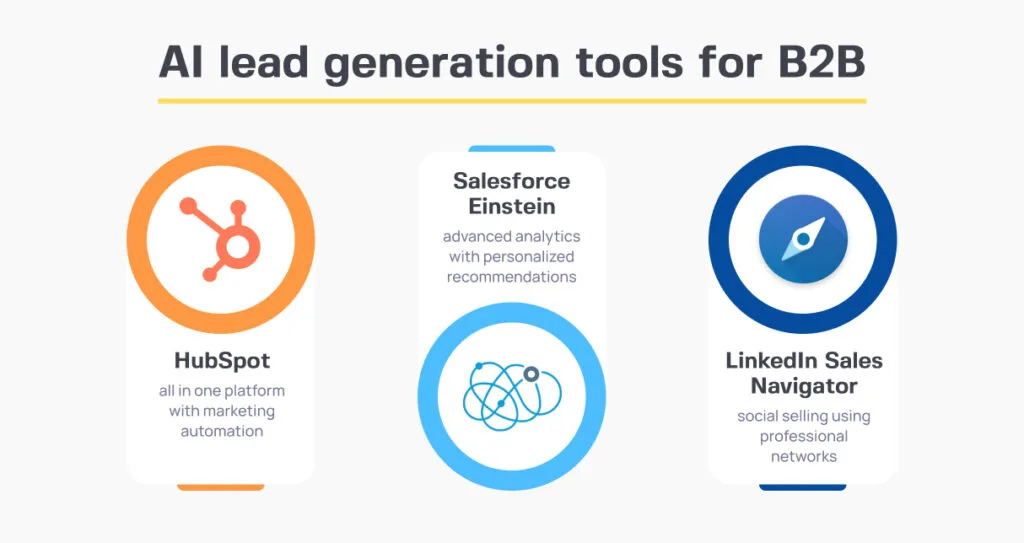The Future of B2B: Harnessing AI Automation to Drive Success
The landscape of B2B is moving as business progressively transform to AI automation for tactical benefit. This change promises to improve efficiency and client engagement via advanced technologies. The assimilation of these tools is not without its obstacles. Understanding exactly how services can navigate this evolving terrain will be crucial for future success. What elements will determine the effectiveness of AI in this field? The responses may redefine traditional business models.
Comprehending AI Automation in B2B
As businesses progressively seek effectiveness, comprehending AI automation in B2B comes to be important. AI automation refers to making use of expert system technologies to simplify and boost organization procedures. In the B2B sector, this includes the combination of AI devices to handle tasks such as information evaluation, consumer interactions, and supply chain procedures. By leveraging equipment understanding and natural language processing, business can enhance precision, lower human mistake, and speed up decision-making (Minarik AI). AI automation helps with the handling of huge volumes of information, enabling services to draw out useful insights and optimize their operations. As organizations browse this technological landscape, a detailed grip of AI automation's capabilities will equip them to stay receptive and affordable to market demands
Secret Advantages of AI Automation for Organizations
While lots of services come to grips with enhancing operational demands, AI automation offers countless benefits that can significantly boost their efficiency. One substantial benefit is performance; AI systems can do recurring jobs faster and with greater precision than people, consequently lowering mistakes and freeing up staff members for more calculated campaigns. Furthermore, AI automation allows data-driven decision-making by analyzing substantial datasets swiftly, offering understandings that inform service approaches. Price reduction is an additional essential advantage, as automation decreases labor prices and enhances source allocation. AI can boost scalability, enabling services to adjust to market modifications swiftly. Eventually, the assimilation of AI automation cultivates development, making it possible for firms to stay competitive in a rapidly developing landscape.
Changing Customer Experiences With AI
AI is reshaping consumer experiences by making it possible for customized communications and boosting involvement. Via the execution of predictive analytics, services can prepare for consumer demands and choices, bring about a lot more customized services. Additionally, streamlining assistance processes with AI innovation improves performance and satisfaction, ultimately transforming the total client trip.
Individualized Interactions and Engagement
Personalized communications have come to be a foundation of efficient client interaction in the B2B landscape. By leveraging AI-driven solutions, companies can customize their interaction and offerings to fulfill the one-of-a-kind requirements of each customer. Automated systems evaluate consumer habits, choices, and data, allowing companies to create tailored experiences that resonate with their audience. This level of customization not just enhances consumer complete satisfaction but also cultivates long-term loyalty. In addition, AI tools facilitate real-time communications, permitting organizations to react without delay and properly to questions and comments. Therefore, companies can construct stronger partnerships with customers, making sure that their services align with developing assumptions. Eventually, customized involvement with AI results in improved outcomes and continual success in the affordable B2B market.
Anticipating Analytics Execution
As organizations progressively seek to improve customer experiences, executing predictive analytics has actually become a pivotal strategy in the B2B sector. By leveraging data-driven understandings, organizations can prepare for consumer needs and choices, allowing them to tailor their offerings much more efficiently. Predictive analytics makes use of historical data and advanced algorithms to anticipate future behaviors, enabling companies to identify potential difficulties and possibilities. This proactive method not just improves client contentment yet likewise fosters commitment by providing pertinent and prompt solutions. In addition, predictive analytics assists in source allowance, ensuring that marketing initiatives are concentrated on high-value potential customers. Ultimately, the assimilation of predictive analytics furnishes B2B business with the tools necessary to transform consumer interactions and drive long-lasting success in an increasingly affordable landscape.
Improving Support Procedures
Enhancing customer experiences in the B2B market prolongs past anticipating analytics; improving support processes plays a crucial function. By incorporating AI-driven services, services can automate routine queries and enhance action times, bring about enhanced consumer complete satisfaction. Chatbots and digital aides provide 24/7 support, attending to client requires promptly and decreasing the burden on human representatives. This automation enables teams to concentrate on complicated problems, fostering even more significant interactions. AI tools can evaluate assistance data to identify trends and areas for enhancement, guaranteeing continual improvement of service quality. As organizations embrace these innovations, they position themselves as customer-centric and receptive, inevitably driving commitment and organization growth in an increasingly affordable landscape.
Enhancing Operations and Processes
Improving operations and procedures in B2B atmospheres is necessary for boosting general efficiency. By maximizing process effectiveness and automating regular tasks, companies can reduce hands-on mistakes and maximize useful sources. This change not only improves productivity yet additionally enables teams to concentrate on strategic initiatives that drive development.
Optimizing Operations Efficiency
Enhancing workflow efficiency is important for organizations looking for to improve and decrease operational expenses performance. By assessing existing procedures, organizations can recognize traffic jams and redundancies that prevent performance. Implementing structured procedures boosts communication and collaboration among groups, making certain that jobs are finished extra quickly. Using data-driven insights allows firms to make enlightened choices that refine operations additionally. Additionally, embracing incorporated innovations can help with seamless information flow, reducing the danger of errors and hold-ups. As companies welcome these modifications, they not just cultivate an extra agile job atmosphere yet likewise position themselves to react swiftly to market needs - AI Automation For B2B. Inevitably, concentrating on process effectiveness permits companies to designate sources properly, driving lasting success in an increasingly affordable landscape
Automating Regular Tasks
Numerous companies are progressively turning to automation to manage routine jobs, identifying its prospective to substantially boost functional efficiency. By deploying AI-driven services, companies can enhance recurring tasks such as data entrance, billing processing, and customer queries. This shift not only minimizes human mistake however also maximizes beneficial worker time, enabling team to concentrate on calculated initiatives and value-added jobs. Additionally, automation can improve action times and solution uniformity, resulting in improved client satisfaction. As organizations browse an affordable landscape, leveraging automation for routine tasks becomes crucial for maximizing process and keeping agility. Inevitably, this strategy promotes innovation and drives growth, positioning companies for lasting success in the progressing B2B setting.
Enhancing Decision-Making Through Information Insights

Overcoming Obstacles in AI Implementation
AI application holds the guarantee of significant operational renovations, companies usually deal with a myriad of challenges that can prevent progression. Trick barriers consist of data top quality issues, as lots of business deal with incomplete or inconsistent datasets necessary for efficient AI training. In addition, resistance to transform within the labor force can impede the fostering of AI modern technologies, as workers may fear task displacement or do not have the necessary skills. Spending plan restraints additionally provide a difficulty, limiting financial investment in the needed facilities and skill. Integrating AI systems with existing processes can be complicated, demanding substantial time and resources. Getting over these obstacles demands a critical method that includes comprehensive training, modification management, and a dedication to continual enhancement in AI initiatives.
Future Fads: The Next Frontier in B2B Automation
While the landscape of B2B automation proceeds to progress, arising fads are poised to redefine exactly how companies operate. The assimilation of advanced man-made intelligence will certainly help with a lot more individualized client experiences, permitting organizations to tailor remedies exactly to client demands. In addition, the increase of anticipating analytics will certainly enable companies to prepare for market shifts and optimize decision-making processes. Automation of regular tasks with robot process automation (RPA) will certainly enhance performance, lowering operational prices substantially. Additionally, the fostering of blockchain innovation guarantees enhanced openness and safety in transactions. As these technologies gain traction, firms will increasingly take advantage of AI-driven understandings to promote partnership, enhance supply chains, and boost total efficiency, marking a transformative change in the B2B landscape.
Often Asked Concerns
What Kinds Of Services Can Profit A Lot Of From AI Automation?
Production, logistics, and customer support organizations can profit most from AI automation. These sectors enhance functional effectiveness, decrease expenses, and improve client interactions, inevitably resulting in boosted productivity and earnings in an affordable market.
How Can Little Companies Implement AI Automation Successfully?
Local business can execute AI automation successfully by determining repetitive jobs, selecting user-friendly tools, making sure adequate training for workers, and gradually integrating options to maximize process while keeping track of efficiency and adjusting techniques based upon comments.
What Prevail Misunderstandings Regarding AI in B2B?
Usual false impressions regarding AI in B2B consist of the belief that it is just for large business, that it ensures instantaneous outcomes, and that it can completely change human decision-making as opposed to enhancing it. Growth Systems For B2B.
How Does AI Automation Effect Employee Roles and Task Safety?
AI automation reshapes worker duties by enhancing recurring jobs, cultivating efficiency and development. While some worry work loss, it typically produces chances for upskilling and brand-new settings, inevitably enhancing work safety with included value and performance.
What Abilities Are Needed to Manage AI Automation Projects?

As companies progressively seek effectiveness, recognizing AI automation in B2B comes to be crucial. AI automation assists in the handling of large quantities of data, allowing companies to extract beneficial insights and enhance their procedures. While several businesses grapple with boosting operational needs, AI automation offers many advantages that can substantially enhance their performance. Automation of routine tasks with robotic process automation (RPA) will enhance efficiency, decreasing functional prices considerably. Production, logistics, and client solution organizations can benefit most from AI automation.